Conversion rate optimization (CRO) tools help businesses increase the percentage of website visitors who take desired actions like making purchases or filling out forms. In 2024, CRO has become crucial for staying competitive and maximizing website traffic value.
When choosing the best CRO tool, consider:
- Features: Heatmaps, session recordings, A/B testing, funnel analysis, personalization
- Ease of Use: User-friendly interfaces and dashboards
- Integrations: Compatibility with your marketing stack (analytics, CRMs)
- Pricing: Plans aligned with your budget, traffic, and feature needs
Related video from YouTube
Quick Comparison
| Tool | Key Features | Pricing |
|---|---|---|
| Optimizely | A/B testing, multivariate testing, personalization, experimentation platform | Custom pricing |
| Hotjar | Heatmaps, session recordings, feedback polls, conversion funnels | From $39/month |
| Google Optimize | A/B testing, multivariate testing, personalization, Google Analytics integration | Free |
| Crazy Egg | Heatmaps, scrollmaps, click tracking, A/B testing | From $24/month |
| Instapage | Landing page builder, A/B testing, heatmaps, analytics | From $149/month |
| Unbounce | Landing page builder, A/B testing, sticky bars, popups | From $80/month |
| VWO | A/B testing, heatmaps, session recordings, funnel analysis, personalization | From $475/month |
| HubSpot | A/B testing, smart content, landing pages, analytics | From $45/month |
| Leadpages | Landing page builder, conversion tools, A/B testing | From $37/month |
| Mixpanel | Event tracking, funnel analysis, cohort analysis, A/B testing | From $17/month |
The right CRO tool should provide insights into user behavior, optimize the customer journey, and continuously improve website performance and conversions. Factors like business size, testing requirements, budget, and need for advanced features like personalization or analytics will guide your selection.
1. Optimizely
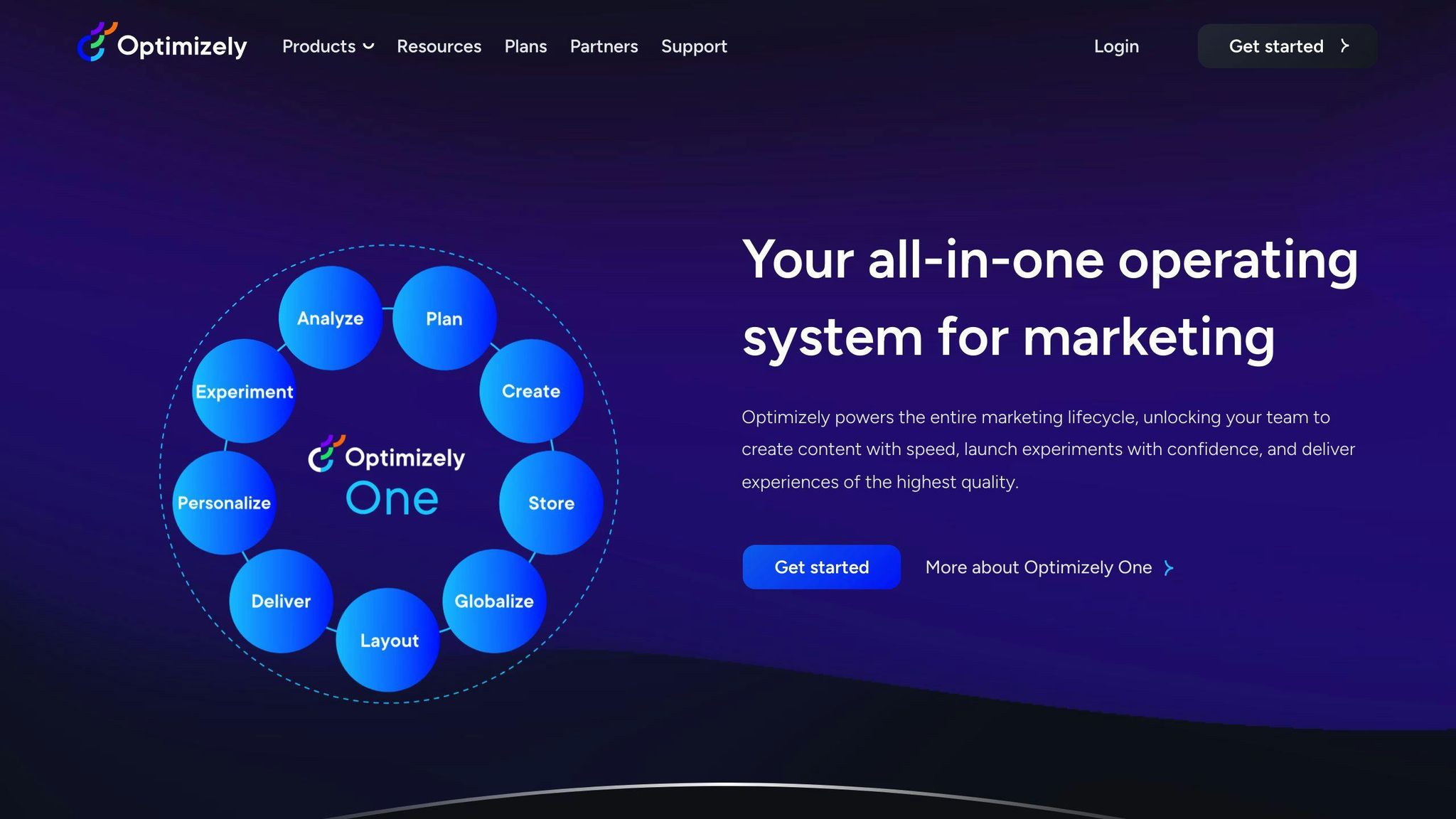
Key Features
- A/B Testing: Compare different versions of your website or app to see which performs better for conversions.
- Multivariate Testing: Test multiple page elements simultaneously to find the best combination for maximizing conversions.
- Personalization: Show tailored experiences to users based on their behavior, demographics, or other attributes.
- Experimentation Platform: Design, run, and analyze experiments to improve conversion rates.
- Analytics: Gain insights into user behavior and experiment performance.
- Cross-device Testing: Ensure consistency and effectiveness across various devices and platforms.
Pricing
Optimizely does not publicly list pricing. Pricing is customized based on each customer's requirements. Contact their sales team for a quote.
Pros and Cons
| Pros | Cons |
|---|---|
| Comprehensive experimentation platform | Pricing not public, can be expensive |
| Robust personalization capabilities | May require professional developers for advanced features |
| Easy-to-use visual editor | Not suitable for websites with low traffic |
| Integrates with tools like Google Analytics and Hotjar | - |
2. Hotjar
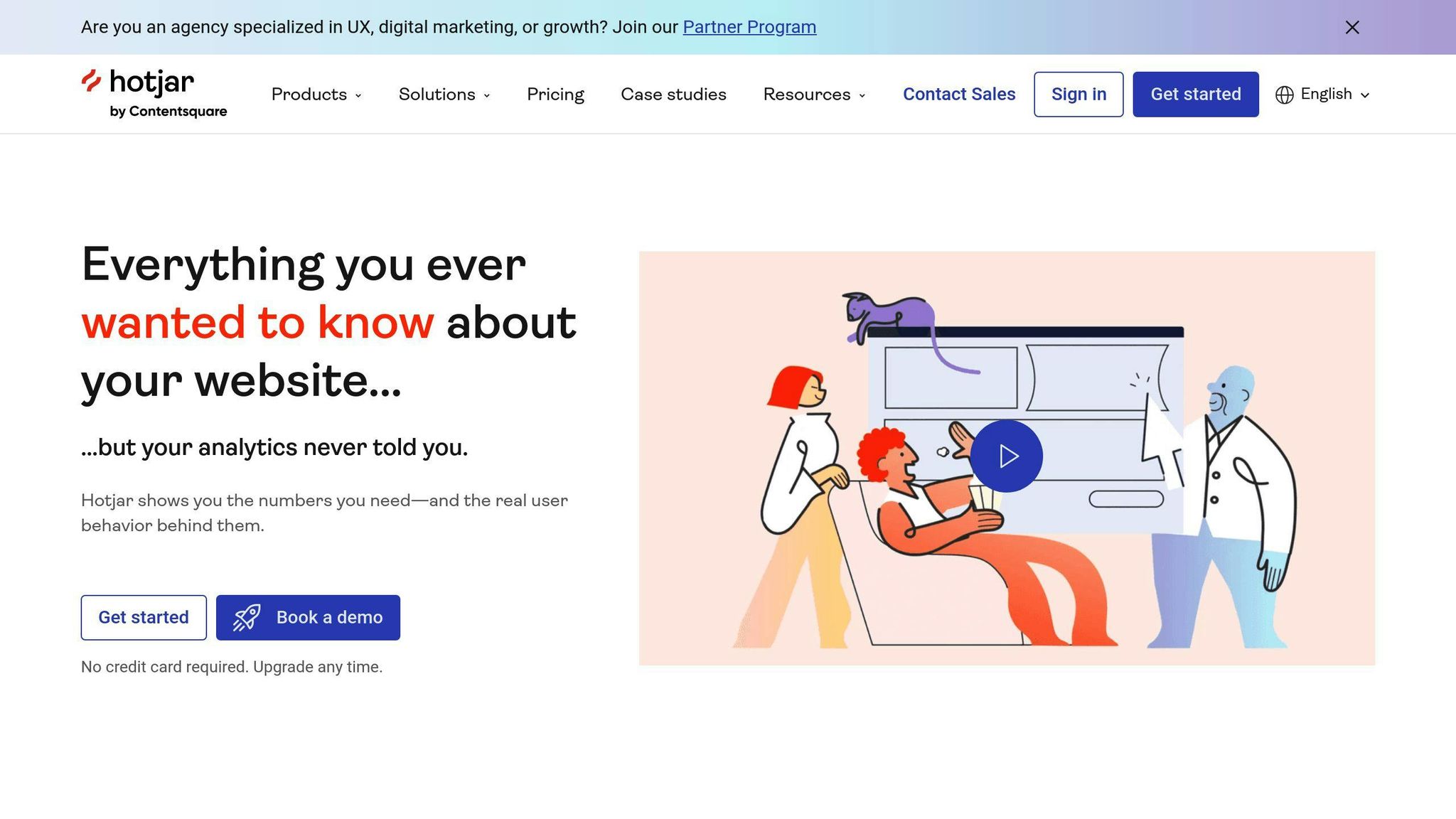
Key Features
- Heatmaps: See where users click, move their cursor, and scroll on your site.
- Session Recordings: Watch real user sessions to understand their behavior.
- Feedback Polls: Get direct feedback from users through on-site polls and surveys.
- Incoming Feedback: Allow users to leave feedback directly on your website.
- Conversion Funnels: Analyze where users drop off in your conversion process.
- Form Analytics: Identify issues in your forms that lead to abandonment.
Pricing
| Plan | Details |
|---|---|
| Free | Unlimited heatmaps and recordings (limited to 1,050 sessions/month) |
| Paid | Starts from $39/month for 3,000 sessions/month |
| Enterprise | Custom pricing for larger organizations |
Pros and Cons
| Pros | Cons |
|---|---|
| Provides insights into user behavior | Limited free plan session recordings |
| Easy to set up and use | No built-in A/B testing |
| Integrates with popular tools like Google Analytics | - |
| Offers a free plan with core features | - |
3. Google Optimize
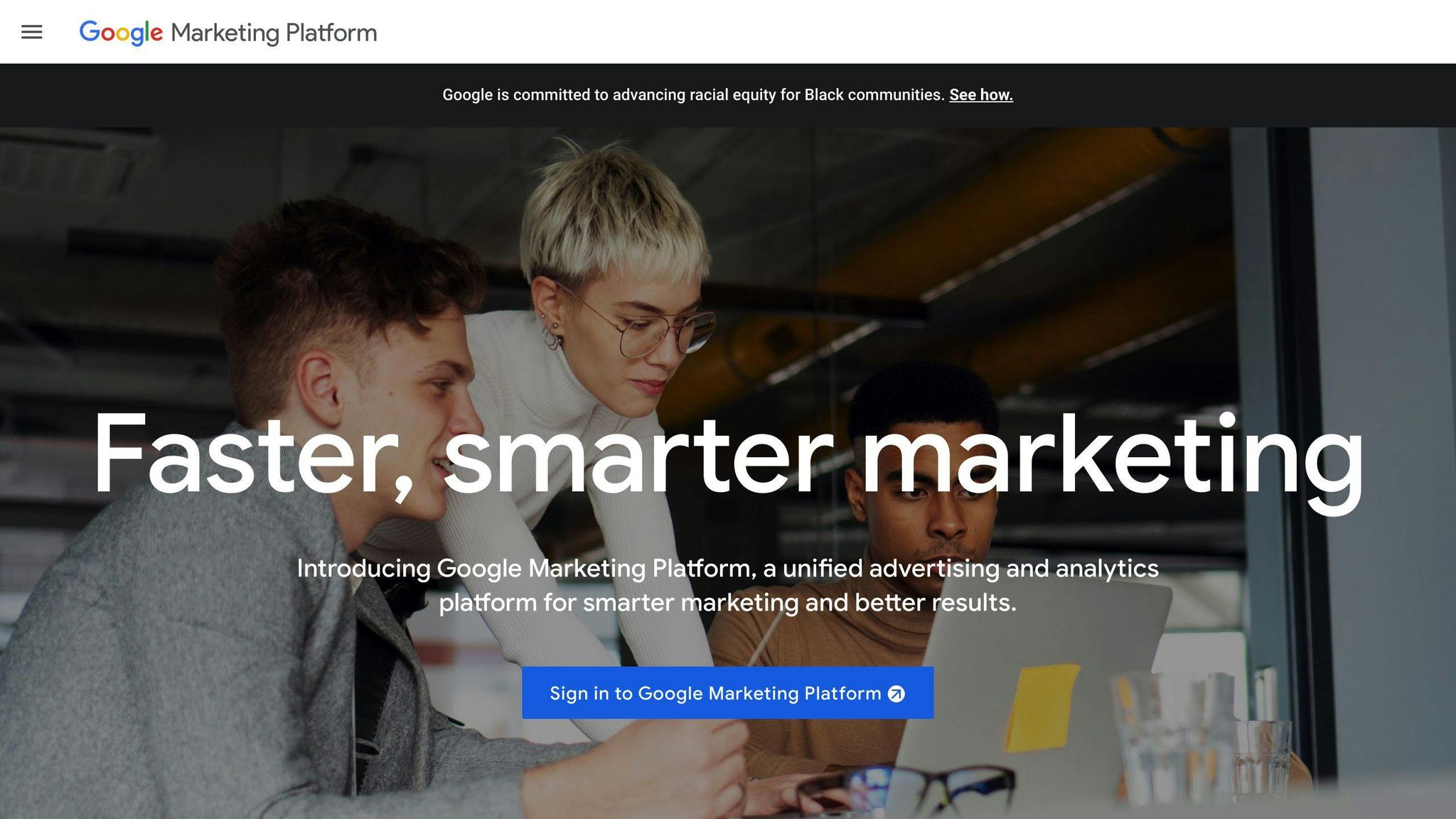
Key Features
- Visual Editor: Create and modify web page versions using a user-friendly, drag-and-drop editor without coding.
- A/B Testing: Compare different page versions to identify the highest-performing one for conversions.
- Multivariate Testing: Test multiple page elements simultaneously to find the best combination.
- Targeting: Show tailored experiences to specific user segments based on location, device, behavior, and more.
- Google Analytics Integration: Seamlessly connect with Google Analytics to track experiment performance.
- Real-Time Reporting: Monitor experiment results in real-time to make data-driven optimization decisions.
Pricing
- Free: Google Optimize is available for free with no limits on traffic or experiments.
| Pros | Cons |
|---|---|
| No cost | Limited advanced targeting options |
| Easy setup and use | Fewer customization options than paid tools |
| Integrates with Google Analytics | Limited support compared to paid plans |
| Powerful A/B and multivariate testing | - |
4. Crazy Egg
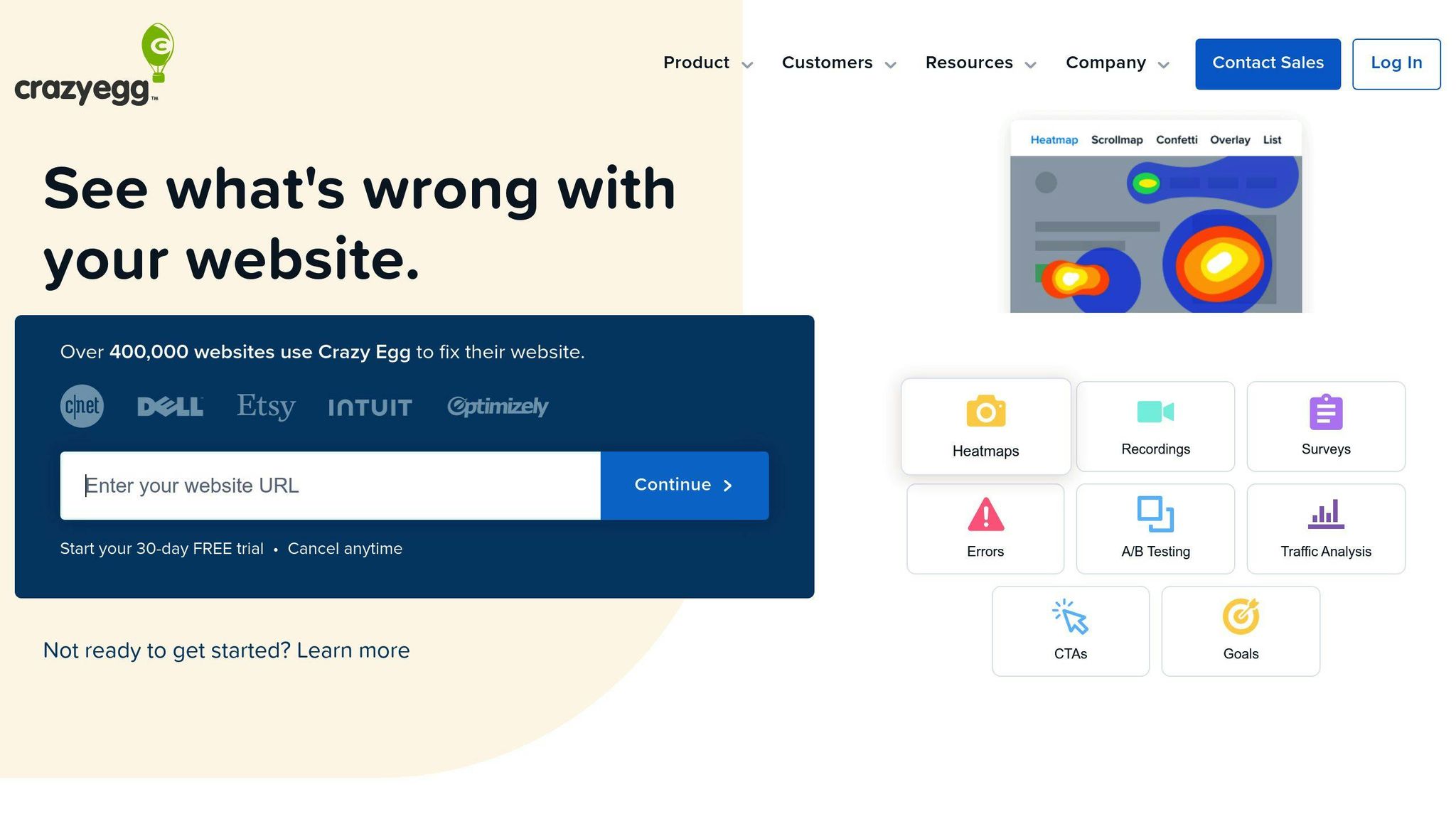
Key Features
- Heatmaps: See where visitors click, move their cursor, and scroll on your pages. Identify high and low engagement areas.
- Scrollmaps: Analyze how far down visitors scroll on each page to optimize content placement.
- Confetti Reports: View individual clicks overlaid on your pages to understand user behavior.
- User Recordings: Watch real user sessions to gain insights into their experience.
- A/B Testing: Create and run A/B tests to compare different page variations and optimize for conversions.
Pricing
| Plan | Details |
|---|---|
| Free Trial | 30 days |
| Basic | $24/month (billed annually) |
| Standard | $49/month (billed annually) |
| Plus | $99/month (billed annually) |
| Pro | $249/month (billed annually) |
| Enterprise | Custom pricing |
| Pros | Cons |
|---|---|
| Easy-to-use interface | Limited integration options |
| Detailed visual analytics | Higher pricing for advanced plans |
| Insightful user recordings | - |
| Simple A/B testing setup | - |
5. Instapage
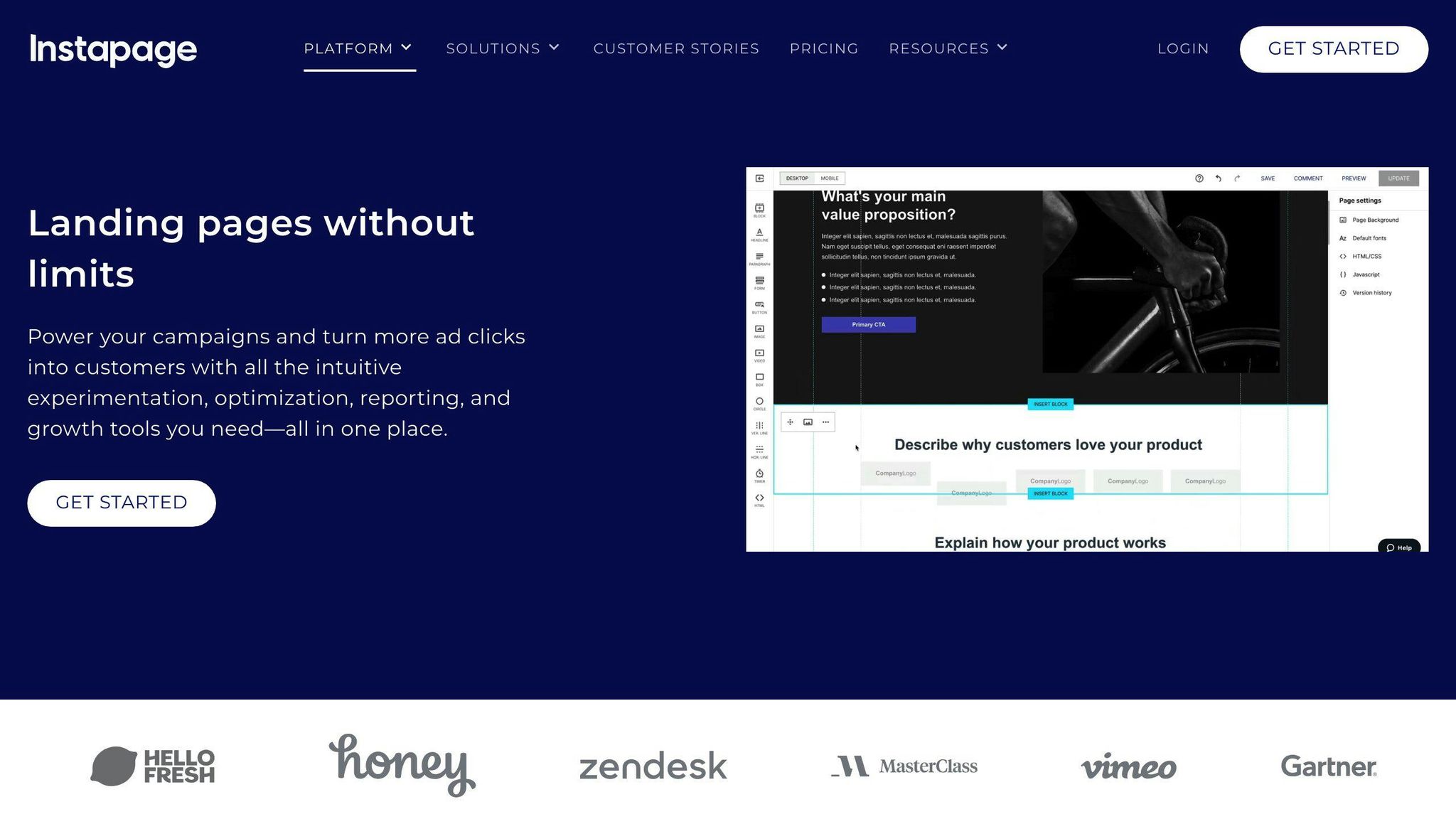
Key Features
- Landing Page Builder: Create mobile-friendly landing pages with Instapage's drag-and-drop builder. Choose from over 200 templates or start from scratch.
- A/B Testing: Set up A/B tests to optimize page elements like headlines, images, and calls-to-action for higher conversions.
- Personalization: Customize landing pages with dynamic text replacement based on visitor data and behavior.
- Integrations: Connect Instapage with tools like Salesforce, HubSpot, and Google Analytics for seamless data flow.
- Collaboration: Allow multiple team members to work on landing pages simultaneously with real-time collaboration features.
Pricing
| Plan | Monthly Cost | Details |
|---|---|---|
| Create | $79 | Drag & drop builder, visual collaboration, popups, AI content creator |
| Optimize | $159 | A/B testing, dynamic text replacement, traffic allocation, multi-step forms |
| Convert | Custom Quote | Heatmaps, audit logs, professional services, custom features |
Pros and Cons
| Pros | Cons |
|---|---|
| Easy-to-use landing page builder | Higher pricing for premium plans |
| Extensive template library | Some learning curve for beginners |
| A/B testing and personalization tools | - |
| Integrates with popular marketing tools | - |
| Real-time collaboration for teams | - |
6. Unbounce
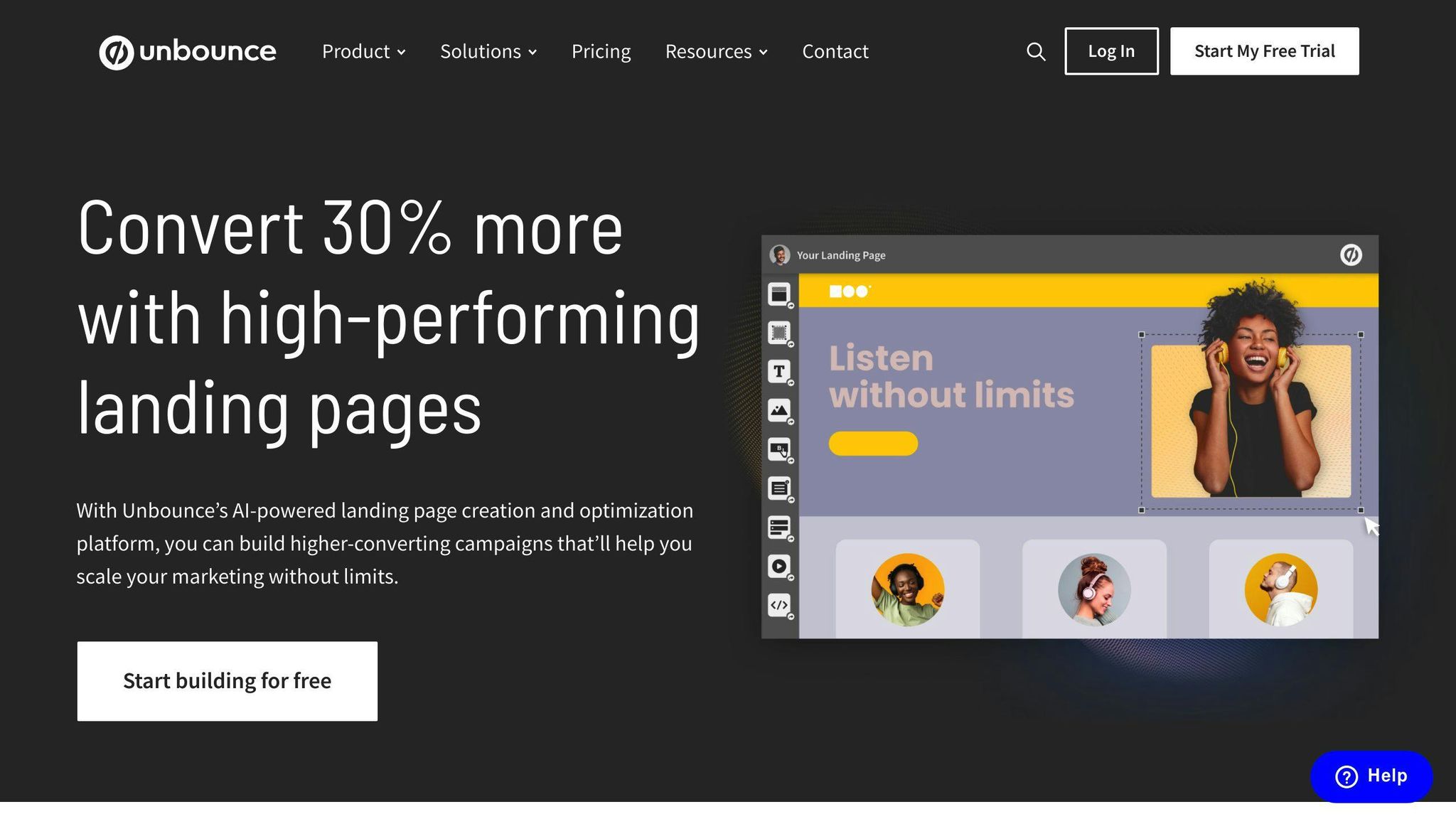
Key Features
- AI Landing Page Builder: Unbounce's Smart Builder uses AI to generate high-converting landing pages based on your industry and goals. Customize the AI-made pages with a drag-and-drop editor.
- Personalized Text: Automatically update text on your landing pages to match visitors' search queries or ad campaigns for higher relevance.
- A/B Testing: Run tests to optimize headlines, images, calls-to-action, and other elements for maximum conversions.
- Sticky Bars and Popups: Create targeted sticky bars and popups to boost conversions with upsells, cross-sells, and promotions.
- Integrations: Connect with popular marketing tools like Google Analytics, Salesforce, MailChimp, and more for seamless data flow.
Pricing
| Plan | Monthly Cost | Details |
|---|---|---|
| Launch | $81 | Drag & drop builder, 100+ templates, popups & sticky bars |
| Optimize | $122 | A/B testing, personalized text, 1000+ integrations |
| Accelerate | $203 | Conversion reports, client management, AI copywriting |
| Concierge | $518 | Dedicated success manager, priority support, custom onboarding |
Pros and Cons
| Pros | Cons |
|---|---|
| AI landing page builder saves time | Higher pricing for small businesses |
| Personalized text for better relevance | Limited free trial period |
| Large template library | |
| Advanced A/B testing tools | |
| Integrates with top marketing tools |
sbb-itb-2c3f1c2
7. VWO
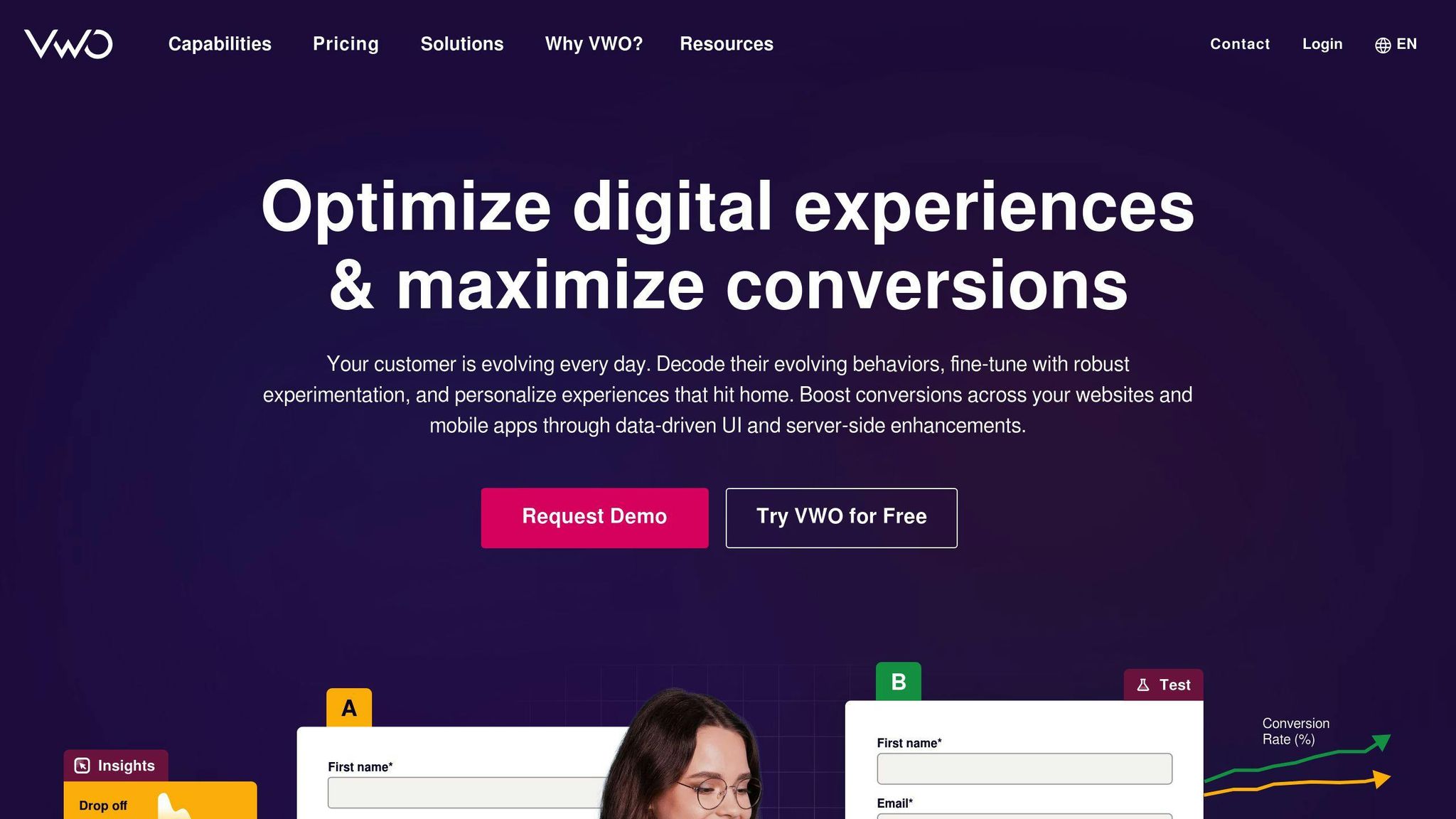
Key Features
- A/B Testing: Compare different versions of web pages to find the highest-converting designs, content, and user experiences.
- Heatmaps and Session Recordings: Visualize where users click, tap, and scroll on your site with heatmaps. Watch real user sessions to identify areas for improvement.
- Conversion Funnel Analysis: Analyze your conversion funnels to find and fix leaks, optimizing the user journey from entry to conversion.
- Personalization: Deliver tailored experiences to different user segments based on their behavior, demographics, and preferences.
- Form Analytics: Analyze how visitors interact with your forms to increase conversion rates.
Pricing
VWO offers four pricing plans:
| Plan | Price |
|---|---|
| Starter | Free (limited features) |
| Growth | $475/month (billed annually) |
| Pro | $1,094/month (billed annually) |
| Enterprise | $1,915/month (billed annually) |
Higher-tier plans provide advanced features like multivariate testing, behavioral targeting, API access, and dedicated account management.
Pros and Cons
| Pros | Cons |
|---|---|
| Testing and optimization tools | Higher pricing for enterprise features |
| User behavior insights | Limited free plan |
| Personalization capabilities | |
| Integrations with marketing tools | |
| Analytics and reporting |
8. HubSpot
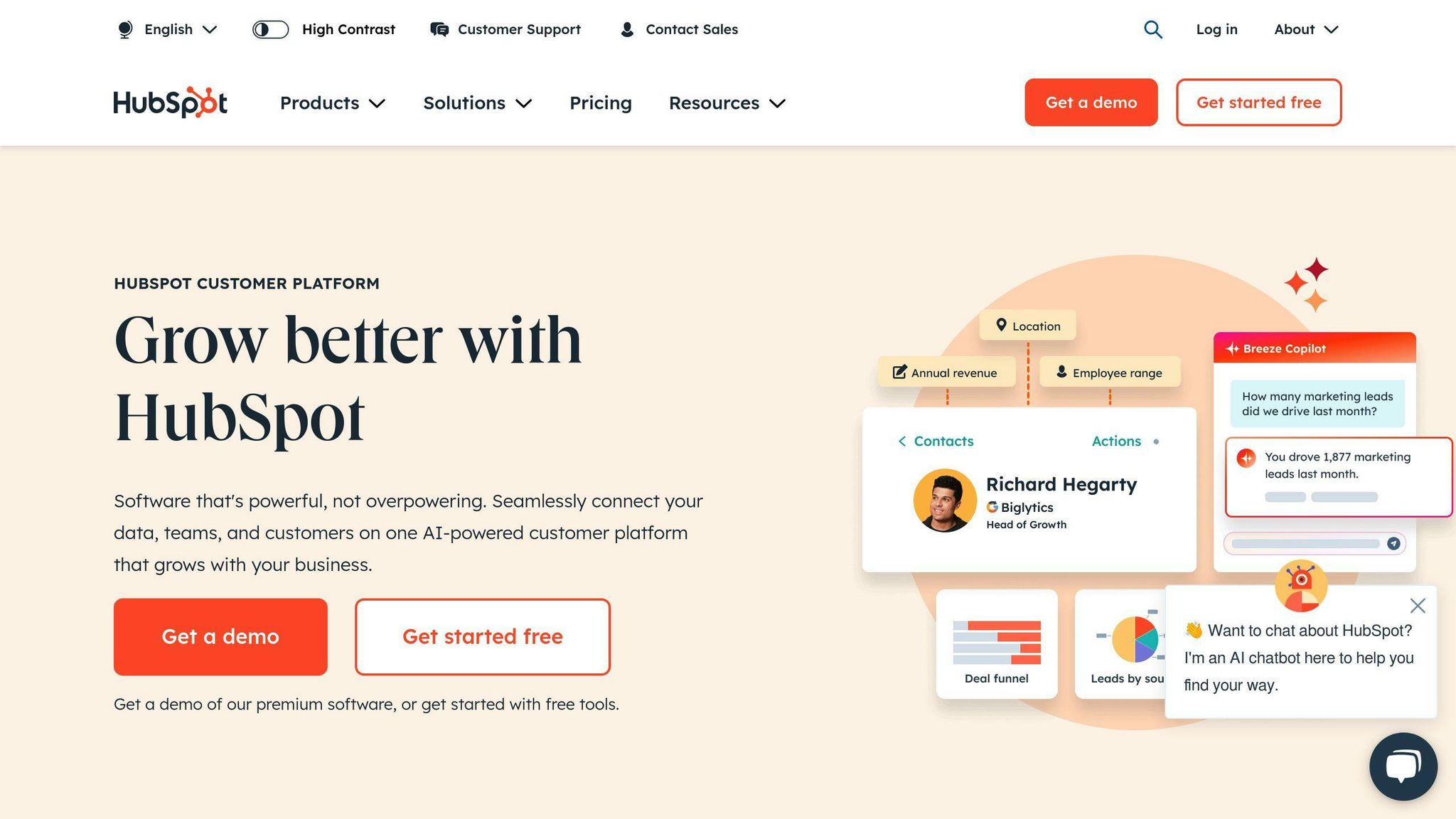
Key Features
- A/B Testing: Compare different versions of web pages to find the highest-converting designs and content.
- Smart Content: Show tailored content blocks and modules to user segments for a personalized experience.
- Conversion-Focused Landing Pages: Templates designed to encourage visitors to take action.
- Analytics and Reporting: Track metrics like conversion rates, bounce rates, and session durations to identify areas for optimization.
Pricing
| Plan | Price |
|---|---|
| Free | $0 |
| Starter | $45/month |
| Professional | $800/month |
| Enterprise | $3,600/month |
Higher-tier plans provide advanced CRO features like A/B testing, smart content, and conversion analytics.
Pros and Cons
| Pros | Cons |
|---|---|
| All-in-one marketing platform | Higher pricing for advanced CRO features |
| CRO tools included | Limited free plan |
| Personalization capabilities | |
| Easy-to-use landing page builder | |
| Detailed analytics and reporting |
9. Leadpages
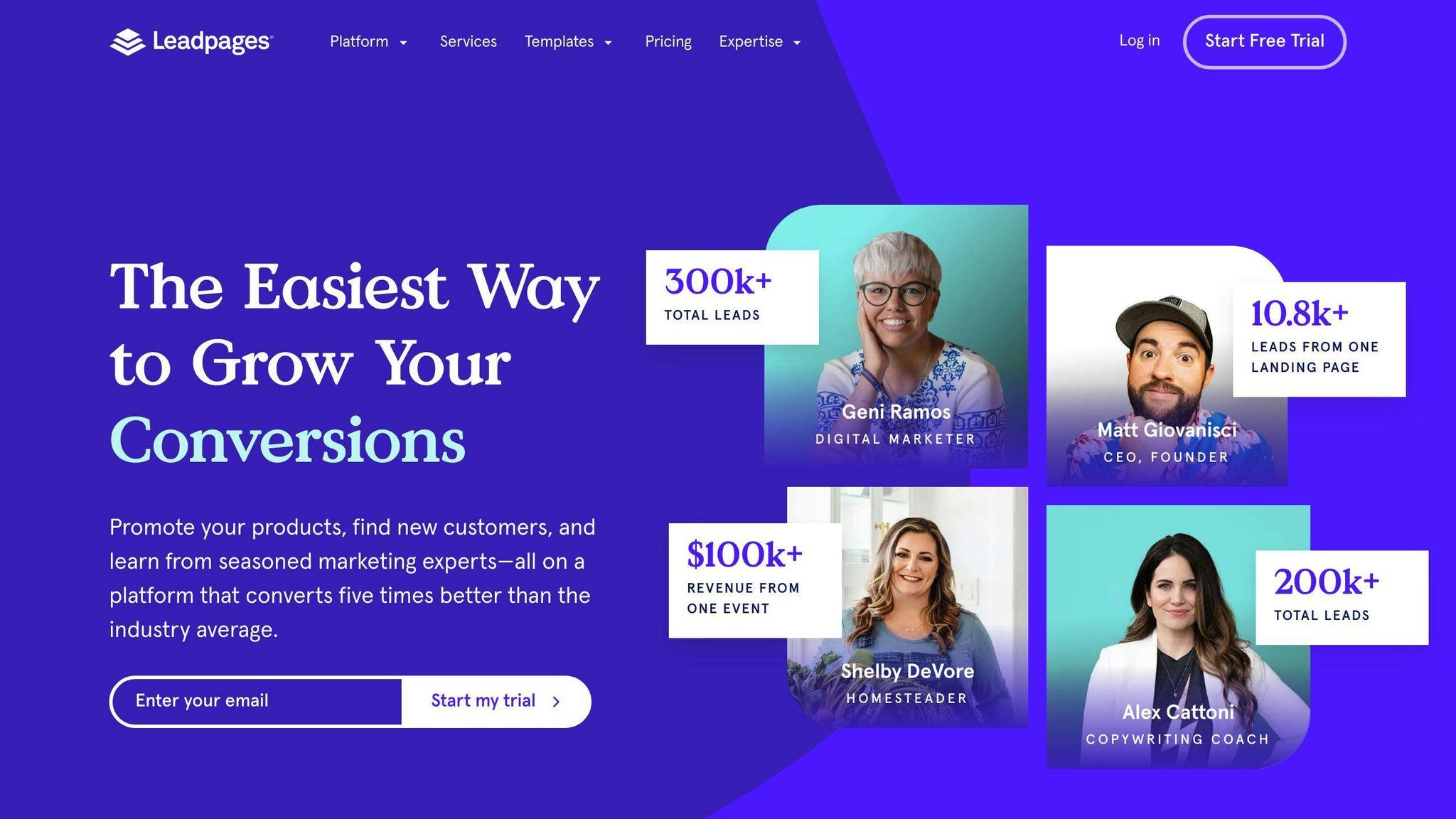
Key Features
- Drag-and-Drop Editor: Create and customize landing pages without coding using Leadpages' user-friendly drag-and-drop editor.
- Conversion Tools: Capture leads effectively with pop-ups, alert bars, and opt-in forms designed to drive conversions.
- Leadmeter: Get real-time tips to optimize your page for higher conversions as you build it.
- Template Library: Choose from over 200 mobile-responsive templates tailored for various goals and industries.
- Integrations: Connect seamlessly with popular marketing tools and services to enhance functionality.
Pricing
| Plan | Monthly Price | Yearly Price |
|---|---|---|
| Standard | $49 | $37 |
| Pro | $99 | $79 |
| Advanced | Custom Pricing | Custom Pricing |
The Pro plan unlocks advanced features like A/B testing, online payments, and priority support.
Pros and Cons
| Pros | Cons |
|---|---|
| Easy-to-use drag-and-drop editor | Limited customization options |
| Tools focused on driving conversions | No free plan |
| Leadmeter for real-time optimization guidance | |
| Extensive template library | |
| Affordable pricing compared to competitors |
10. Mixpanel
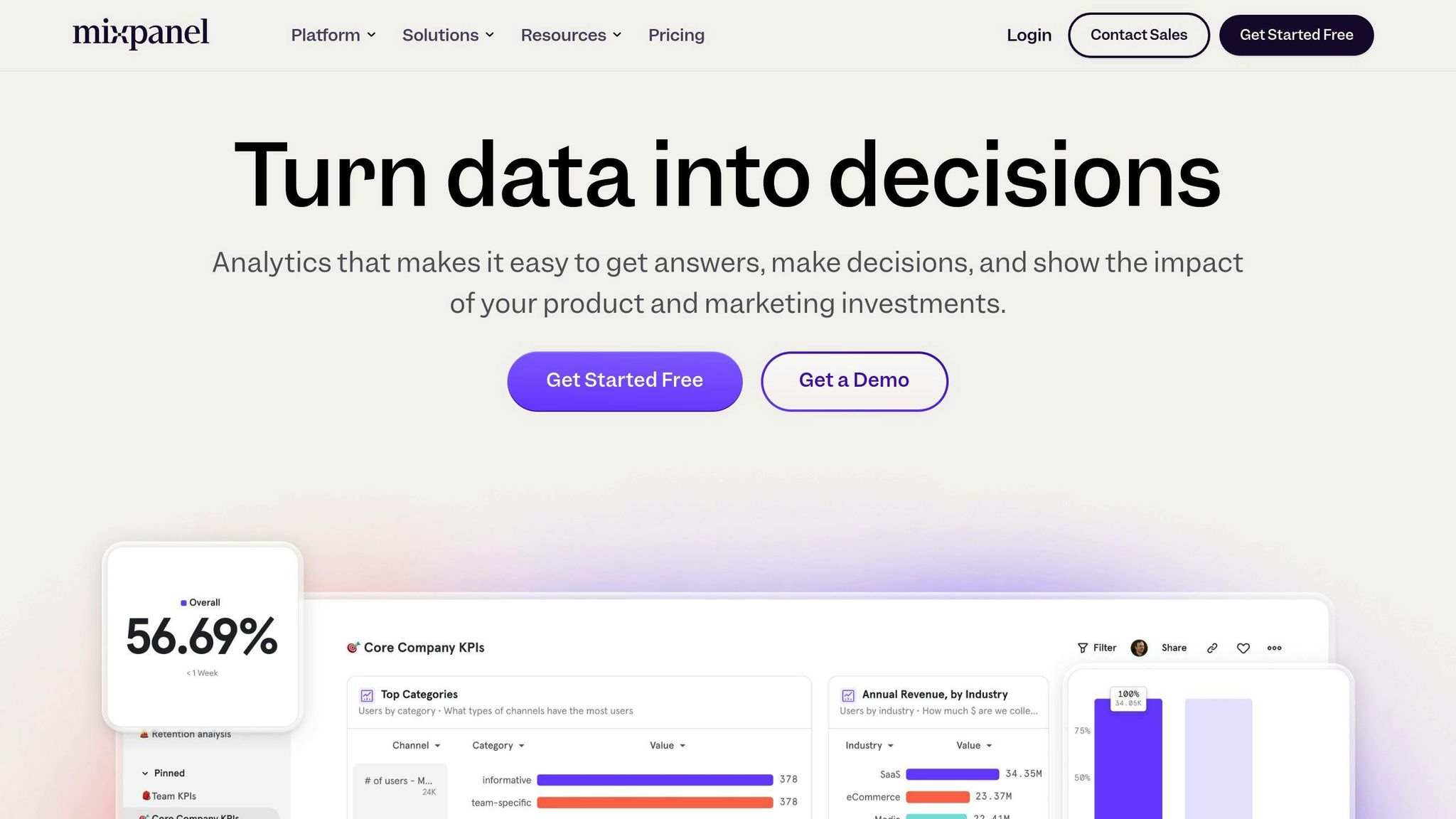
Key Features
- Event Tracking: Monitor user actions, page views, clicks, and other interactions across web and mobile apps.
- Funnel Analysis: Visualize user flows to identify drop-off points and optimize conversion paths.
- Cohort Analysis: Group users based on shared traits or behaviors to analyze retention and engagement.
- A/B Testing: Test variations of features, UI elements, and messaging to drive conversions.
- Push Notifications: Send targeted in-app and push notifications to re-engage users based on their behavior.
- Data Visualization: Build custom reports and dashboards to monitor key metrics and gain insights.
Pricing
| Plan | Monthly Price | Key Limitations |
|---|---|---|
| Free | $0 | 100K monthly tracked users, limited features |
| Growth | Starting at $17 | Pricing based on monthly tracked users, unlimited reports & cohorts |
| Enterprise | Custom pricing | Advanced features, premium support, no user limits |
Pros and Cons
| Pros | Cons |
|---|---|
| Detailed event tracking and funnel analysis | Steep learning curve for advanced features |
| In-depth segmentation and cohort analysis | Limited customer support on lower-tier plans |
| Powerful data visualization and reporting | Pricing based on monthly tracked users |
| Supports A/B testing and push notifications | Customization requires technical expertise |
| Integrates with various tools and platforms |
Comparing CRO Tools
Here's a simple comparison of the top CRO tools for 2024:
| Tool | Key Features | Pricing | Rating |
|---|---|---|---|
| Optimizely | A/B testing, multivariate testing, personalization, audience targeting, analytics | From $50 to $2,000/month | 4.2/5 |
| VWO | A/B testing, multivariate testing, heatmaps, session recordings, funnel analysis | From $149/month | 5.0/5 |
| Google Optimize | A/B testing, multivariate testing, personalization, Google Analytics integration | Free | 4.7/5 |
| Hotjar | Heatmaps, session recordings, surveys, feedback polls, user testing | From $39/month | 4.8/5 |
| Crazy Egg | Heatmaps, scrollmaps, click tracking, A/B testing | From $24/month | 4.5/5 |
| Instapage | Landing page builder, A/B testing, heatmaps, analytics | From $149/month | 4.6/5 |
| Unbounce | Landing page builder, A/B testing, sticky bars, popups | From $80/month | 4.5/5 |
| HubSpot | Marketing automation, email marketing, CRM, A/B testing | From $50/month | 4.3/5 |
| Leadpages | Landing page builder, A/B testing, lead capture, analytics | From $37/month | 4.4/5 |
| Mixpanel | Event tracking, funnel analysis, cohort analysis, A/B testing | From $17/month | 4.6/5 |
VWO and Optimizely offer the most complete CRO tools. They provide A/B testing, multivariate testing, and personalization features. VWO is user-friendly and affordable, while Optimizely has advanced options for larger businesses.
Google Optimize and Hotjar are excellent free or low-cost choices for basic A/B testing, heatmaps, and user behavior insights. Crazy Egg, Instapage, and Unbounce focus on heatmaps, landing page optimization, and conversion rate optimization.
HubSpot, Leadpages, and Mixpanel offer CRO tools as part of their broader marketing automation and analytics platforms, suiting businesses with diverse needs.
When choosing a CRO tool, consider:
- Your business size
- Testing requirements
- Budget
- Need for advanced features like personalization, audience targeting, or in-depth analytics
- Integrations with existing tools
- Ease of use
Choosing the Right CRO Tool
Selecting the right CRO tool for your business is crucial. Here are some key factors to consider:
1. Business Size and Industry
The size of your business and the industry you operate in will impact the features and capabilities you need in a CRO tool. Larger companies may require more advanced tools with robust testing, personalization, and analytics features, while smaller businesses can often use more basic, cost-effective solutions.
2. Specific CRO Needs
Identify your primary CRO needs, such as:
- A/B testing
- Heatmaps
- User behavior analysis
- Funnel analysis
- Personalization
Choose a tool that aligns with your priorities.
3. Integration with Existing Tools
Ensure the CRO tool seamlessly integrates with your existing tools, such as:
- Website
- Analytics platform
- CRM
- Other essential tools
Smooth integration will streamline your workflows and provide a unified view of your data.
4. Ease of Use
Consider the tool's user interface and learning curve. While advanced tools offer more features, they may also be more complex to use. Strike a balance between functionality and ease of use to ensure efficient adoption and implementation.
5. Scalability
As your business grows, your CRO needs may evolve. Choose a tool that can scale with your business and accommodate future requirements, such as:
- Increased traffic
- More complex testing scenarios
- Advanced personalization
6. Customer Support and Resources
Evaluate the level of customer support and resources provided by the CRO tool vendor. Reliable support, documentation, and a strong user community can be invaluable when facing challenges or seeking guidance.
| Factor | Description |
|---|---|
| Business Size and Industry | Consider the size of your business and the industry you operate in to determine the required features and capabilities. |
| Specific CRO Needs | Identify your primary CRO needs, such as A/B testing, heatmaps, user behavior analysis, funnel analysis, or personalization. |
| Integration with Existing Tools | Ensure the CRO tool seamlessly integrates with your existing tools, such as your website, analytics platform, CRM, and other essential tools. |
| Ease of Use | Consider the tool's user interface and learning curve. Strike a balance between functionality and ease of use. |
| Scalability | Choose a tool that can scale with your business and accommodate future requirements, such as increased traffic, more complex testing scenarios, or advanced personalization. |
| Customer Support and Resources | Evaluate the level of customer support and resources provided by the CRO tool vendor, such as reliable support, documentation, and a strong user community. |
Summary
Choosing the right conversion rate optimization (CRO) tool is key to boosting your website's conversions and achieving business goals. With many CRO tools available, it's important to evaluate your specific needs, budget, and existing tech stack to find the best fit.
When selecting a CRO tool, consider:
- Business Size and Industry: Larger companies may need advanced tools with robust testing, personalization, and analytics. Smaller businesses can often use more basic, cost-effective solutions.
- CRO Requirements: Identify your priorities, such as A/B testing, heatmaps, user behavior analysis, funnel analysis, or personalization.
- Tool Integration: Ensure the CRO tool integrates seamlessly with your website, analytics platform, CRM, and other essential tools.
- Ease of Use: Balance functionality with user-friendliness to ensure efficient adoption and implementation.
- Scalability: Choose a tool that can grow with your business and accommodate future needs like increased traffic or advanced personalization.
- Support and Resources: Evaluate the vendor's customer support, documentation, and user community.
| Factor | Description |
|---|---|
| Business Size and Industry | Consider your company size and industry to determine required features and capabilities. |
| CRO Requirements | Identify priorities like A/B testing, heatmaps, user behavior analysis, funnel analysis, or personalization. |
| Tool Integration | Ensure the CRO tool integrates with your website, analytics, CRM, and other essential tools. |
| Ease of Use | Balance functionality with user-friendliness for efficient adoption. |
| Scalability | Choose a tool that can grow with your business and accommodate future needs. |
| Support and Resources | Evaluate the vendor's customer support, documentation, and user community. |
While some tools excel in specific areas like advanced testing or personalization, others offer a comprehensive suite suitable for businesses of different sizes and industries. Combining multiple tools can leverage their strengths and create a robust CRO strategy.
The right CRO tool(s) should empower data-driven decisions, provide user behavior insights, optimize the customer journey, and continuously improve website performance and conversions.
Investing in the right CRO tools can yield substantial returns through increased conversions and revenue. Regularly review and adjust your CRO strategy and tools as your business evolves to ensure you're delivering the best user experience and maximizing conversions.
FAQs
What CRO tool software do you use?
One of the most widely used CRO tools is Optimizely. This tool allows you to test content, web pages, and features to gain insights that can help improve your experiments. It's a great tool for personalizing ecommerce experiences. Optimizely is designed for developers, leaders, and content creators.
Here are some key features of Optimizely:
- A/B testing: Run tests on any part of your website or app to see which variations perform better.
- Multivariate testing: Test multiple elements at the same time to find the best combination.
- Feature flagging: Roll out new features to specific user segments for testing.
- Personalization: Deliver tailored experiences based on user attributes and behavior.
- Experimentation program management: Streamline the process of planning, building, and analyzing experiments.
- Integrations: Optimizely integrates with analytics tools, CRMs, and other marketing platforms.
While Optimizely is a powerful CRO solution, it's important to evaluate your specific needs and budget when choosing a tool. Other popular options like Hotjar, Google Optimize, and VWO offer different strengths in areas like heatmapping, funnel analysis, and enterprise testing capabilities.
| Tool | Key Features | Pricing |
|---|---|---|
| Optimizely | A/B testing, multivariate testing, personalization, feature flagging, experimentation program management | Custom pricing based on requirements |
| Hotjar | Heatmaps, session recordings, feedback polls, conversion funnels, form analytics | Starts from $39/month |
| Google Optimize | A/B testing, multivariate testing, personalization, Google Analytics integration | Free |
| VWO | A/B testing, multivariate testing, heatmaps, session recordings, funnel analysis, personalization | Starts from $475/month |
When choosing a CRO tool, consider your business size, testing requirements, budget, need for advanced features like personalization or in-depth analytics, integrations with existing tools, and ease of use.


